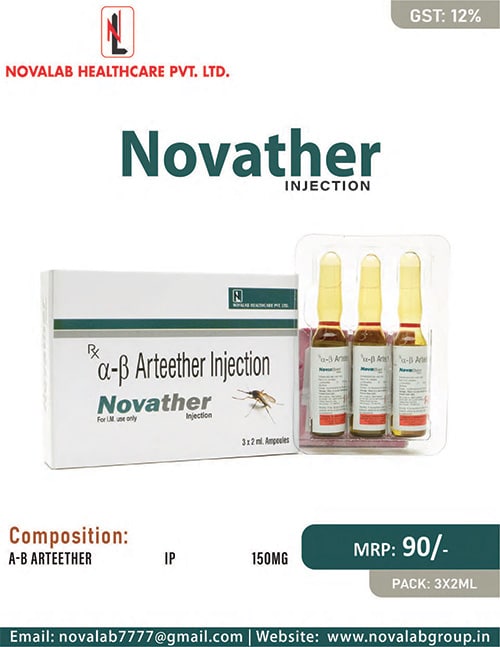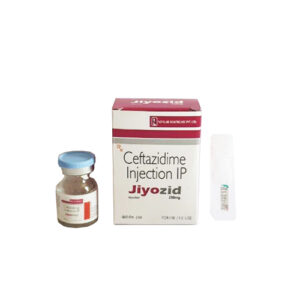
Arteether Injection: is a drug used to treat severe malaria caused by Plasmodium falciparum, a parasite spread by mosquitos. It contains the active component, which is a medication in the artemisinin class. The injection kills malaria parasites in the bloodstream by attacking and destroying them. The injection is given intramuscularly and is quickly absorbed, allowing for immediate action against the parasites. It is often reserved for severe cases of malaria when oral treatments are ineffective or impractical. Arteether Injection relieves malaria symptoms, lowers parasite load, and aids in the healing process.
How Arteether Injection Works?
The injection works by targeting and eradicating the malaria parasites that cause severe malaria (particularly Plasmodium falciparum). It is part of a class of medications known as artemisinins, which have significant antimalarial activities. It is readily absorbed into the bloodstream when injected intramuscularly. It conducts chemical reactions inside the body and creates free radicals that are harmful to malaria parasites. These free radicals assaults and damage the parasites, interfering with their regular metabolic activities and eventually killing them. The injection is very efficient against the parasite’s early stages of life, allowing for a rapid reduction in parasite levels and relief of malaria symptoms.
Benefits of Using Arteether Injection
Arteether Injection has significant advantages in the treatment of severe malaria. It has a fast and effective antimalarial activity, killing the malaria parasites, notably Plasmodium falciparum. The injection instantly alleviates symptoms including high fever and muscle aches. It decreases the parasite burden, which aids in recuperation. Arteether is also efficient against drug-resistant forms of malaria. Because it is not administered orally, it is appropriate for people who cannot swallow or have gastrointestinal difficulties. When delivered in a hospital setting, close monitoring is possible. However, due to potential adverse effects and contraindications, it should only be administered under the guidance of a healthcare practitioner.
How to Use Arteether Injection
A healthcare professional should provide Arteether Injection. Here’s a general guide on using the Injection:
- Make sure the injection vial is intact and the solution is clear. If there are any symptoms of discoloration or particles in the solution, do not use it.
- Sterilization: To reduce the risk of infection, clean the injection site with an antiseptic solution.
- The injection is normally administered intramuscularly (into the muscle) in the upper outer quadrant of the buttock. The healthcare professional will remove the proper dose of Arteether Injection using a sterile needle and syringe.
- Needle insertion: The needle is placed at a 90-degree angle into the muscle rapidly and smoothly. Blood vessels and nerves are avoided at all costs.
- Disposal: Place the needle and syringe in an appropriate sharps container, following all safety precautions.
- To control any bleeding, use a sterile cotton ball or swab at the injection site. Provide all essential post-injection care as directed by your healthcare provider.
Precaution While Using Arteether Injection
When using Arteether Injection to treat severe malaria, the following precautions must be followed:
- This Injection should be administered under the guidance of a healthcare professional who is experienced in the treatment of severe malaria. They will decide the proper dosage and keep track of the patient’s reaction to the drug.
- Allergies and hypersensitivity: Tell your doctor if you have any allergies or sensitivities to artemisinin derivatives or any other drugs. If you have a history of allergic responses, you should exercise caution to avoid any negative effects.
- Pregnancy and breast-feeding: If you are pregnant or breastfeeding, consult a healthcare practitioner before taking Arteether Injection. Alternative treatments may be advised in specific cases if the possible dangers and benefits are thoroughly assessed.
- Drug interactions: Tell your doctor about any other drugs, supplements, or herbal products you’re using. The injection may interact with some drugs, resulting in undesirable effects or decreased efficacy. It is critical to share your entire drug history.
- During treatment with Arteether Injection, blood parameters such as complete blood count, liver function, and kidney function may need to be monitored regularly. This ensures that the drug is well-tolerated and does not affect key organs.
Side Effects of Using Arteether Injection
While Arteether Injection is generally well tolerated, some people may experience negative effects. The following are examples of common side effects:
- Nausea, vomiting, diarrhea, and abdominal discomfort are common gastrointestinal symptoms.
- Dizziness and headaches: In certain people, it can induce dizziness and headaches.
- Muscle and joint pain: Some individuals may have pain or stiffness in their muscles and joints.
- Allergic reactions: Allergic responses, such as skin rashes, itching, swelling, or difficulty breathing, might occur in rare cases. If you see any signs of an allergic reaction, get medical attention right once.
- Changes in electrocardiogram (ECG): Arteether can induce changes in the electrical activity of the heart, which can be detected on an ECG. Regular monitoring may be required.
- It may cause aberrant liver function in some people, resulting in increased liver enzymes or jaundice.
- Arteether can cause transitory changes in blood cell counts, such as a decrease in white blood cells, red blood cells, or platelets. These factors may be monitored with regular blood testing.
| Pack Size | 3.2ml |
|---|
Related products
We are a research-based pharmaceutical company. The mission of Novalab Healthcare is to improve the health of the Indian community by providing them with quality
Quick Links
Location
- Plot No-208, Industrial Area Phase 1, Panchkula, Haryana 134113
- Novalab7777@gmail.com
- +91-9570599567
- +91-9115604598







